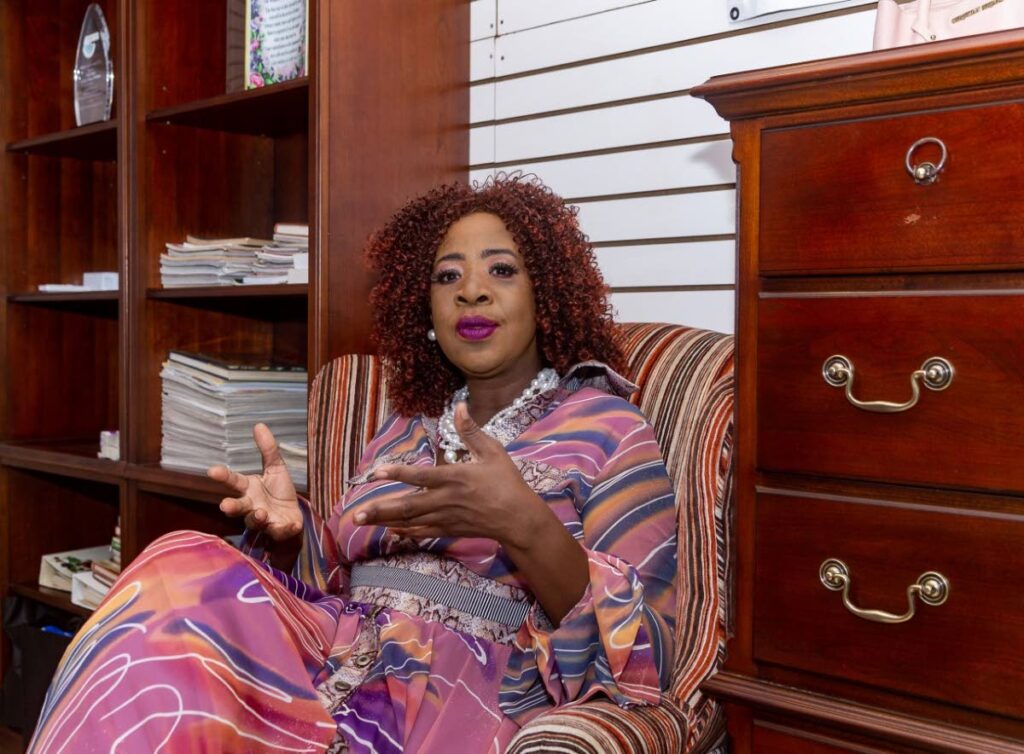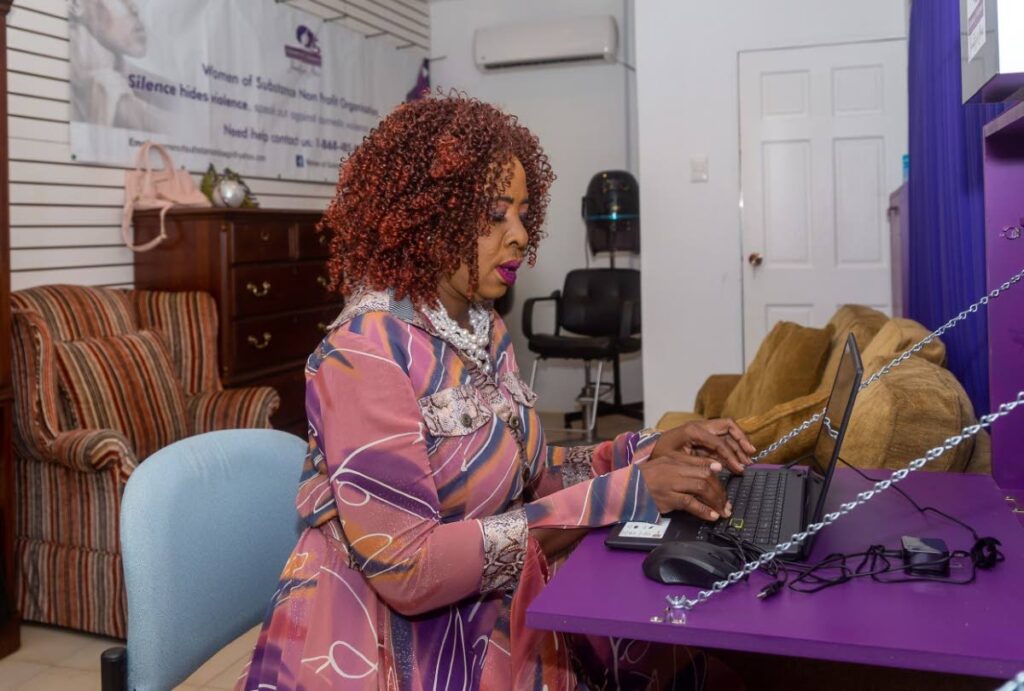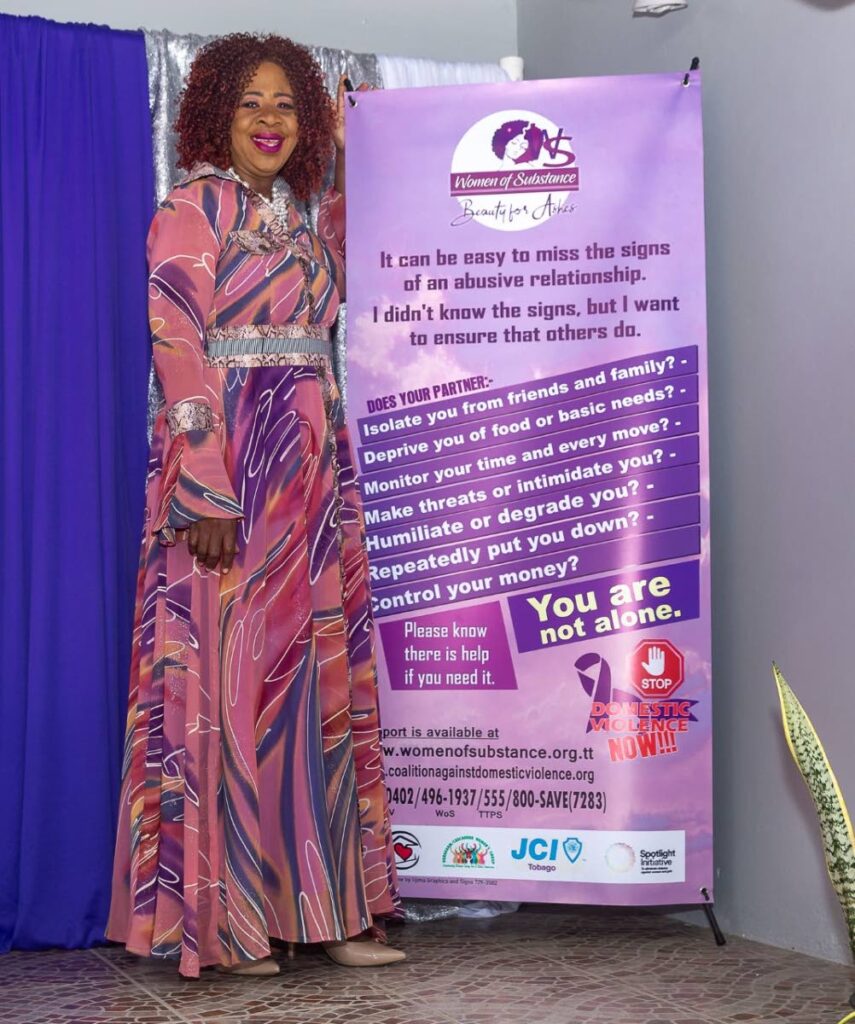Onika Mars marks 5 years of helping victims of abuse in Tobago

With its mission to reduce and ultimately eliminate domestic violence and abuse in its various manifestations, Women of Substance, led by Onika Mars, is celebrating five years.
Mars, from Castara, Tobago, said she is “beyond excited.”
“Every time I think about it, I think about where Women of Substance came from in terms of the birth five years ago,” an upbeat Mars told Newsday.
She recalled the negativity she encountered when she decided to establish the non-governmental organisation.
“People were saying, ‘Onika, you going into that? Onika, you want to fight up with those women?
“But what the critics did to me was fuel my fire. I was just determined to go on and make it work and learn as I go along my journey.”
Mars added, “I know that God gave me a mandate to help women, to give them that hope and encouragement, to let them know that I am a survivor and God would have intervened and delivered me from the situation and he could do it for you. I put on blinders, and I said, ‘Let me just focus on the task ahead and go forth.’”
Mars does not have any current statistics on the prevalence of domestic violence in Tobago. But she observed that most victims go back to the abuser.
“I listened and I smiled because for me, it was never me fighting up with victims. What I saw is God calling me into ministry and me walking in obedience. If God calls me to something, why not? He knows that some women would go back, he knows the challenges of having an NGO, never being a part of an NGO before, never even knowing anything about the NGO world.”
She recalled the birth of Women of Substance in 2017.
“It came from three persons who brought the same message, that it was time to start an NGO to assist women.
“I know that God confirms stuff to me in threes, because I’ll hear it once, I’ll hear it twice and I was like, ‘Okay, God, just confirm one more time if it’s you,’ and because I am aware of that, when I got the third confirmation, I was like, ‘Okay.’”
Mars quickly got to work registering the NGO.
Looking back, she said the journey has been exciting.

“It is a lot of work and people see what they consider the glory, but they don’t know the story. People think its easy work – it’s a lot of work. But it’s not something that I don’t enjoy, and I just want to encourage corporate Trinidad and Tobago and of course the citizens to support NGOs like Women of Substance and others who are reaching out to vulnerable women to offer assistance to them.”
In its five years, her NGO has run several projects.
“We have the sit and chat domestic violence support group – Sit and Chat by Onika Mars – where we invite survivors and victims to sit and chat in a safe space about their experiences.
“We’ve had the Purple Bench Project where we are placing purple benches in every community throughout TT.”
That was launched in Tobago in November 2020 and in Trinidad last year.”
With Digicel as its main sponsor, the group recently launched Shangril-La.
“Shangri-La is a safe space, where they can come in and receive psychosocial support. We have a beauty corner where they can have their natural hair done, we have computers that they can access and if they want to learn computer literacy, they can do that. If they want to do an online course they can do that.
“If they want to come and just get away from their situation and just have a cup of coffee or tea, that can be done also.”
Operating out of her home in Lowlands, next for the NGO is a shelter for abused women.
“We’re praying and trusting God that this would be established before the end of the year. We already got the property from THA, so it’s just to finalise with the deed. The deed is already prepared, so we are just waiting to have it stamped and registered. So we are at the last stage of that.”
When completed, the shelter will accommodate ten women and their families.
Mars acknowledged that there are women who are victims of abuse, yet choose to remain silent. She has advice for them.
“Speak out. Find some trusted friend or agency that you can reach out to for help, because abuse thrives in silence.
“If you decide that you feel ashamed, I don’t want to say anything, because I’m thinking about what people would say, or how people would perceive me, then you would continue to suffer in silence.
“If you have children in that relationship, then it means that your children are being destroyed, slowly but surely, because your children would be exposed to that toxic environment.”
Having received some counselling herself, she said that the group has access to people who can offer these services as well. Questioned about the number of women who make use of its services, she said that the number fluctuates.
Becoming a survivor
Describing her own experience, Mars said she had been in a relationship for 13 years, during which she had two sons.
“The relationship started out like any other relationship, I would say normal, or what I consider normal back then.”
She said now that she is involved in domestic violence advocacy, she realises she saw signs that were ignored.
“I saw signs such as jealousy. I saw insecurity, I recognised insecurities in my partner. I recognised that he tried to isolate me after a few years in the relationship – isolate me from family and friends. He was being,,,overly controlling, I saw some traits of control.

“But I didn’t know much about domestic violence and abuse, in the sense that I thought domestic violence and abuse was only physical.
“What I recognised is that he’ll also call very often – every minute he would call me and ask – where are you, who are you with, what are you doing.
“At first, as women, we like the kind of attention, and you know, you’re thinking your partner is caring and wants to know what you’re up to and know your every move – not understanding that perpetrators are very crafty, so they bring you to that place of trust and everything, and then the control and the power steps in, because domestic violence is about power and control.”
She said he was very loving, seemed to be very kind and they accompanied each other everywhere, and she always thought that is how a relationship was supposed to be.
At one time, she lived in Trinidad, but would sometimes travel to Tobago to visit her family. He would frequently accompany her.
“My family and I are very close and sometimes I would just want to spend that quality time with them, and he would want to be there. At first, it was okay and couple years into the relationship I started to open my eyes and wondering why, but it was because of his insecurities.”
She said whenever she told him she was going to Tobago, he would always propose something. Mars would often realise he did not have plans to do anything.
One weekend, she still travelled to Tobago despite his saying he had plans for them.
“We had started living together, he had moved into my home. I didn’t even know when that happened, because it wasn’t like we sat and had a discussion.
“When he went to work that Saturday morning, I packed an overnight bag and went to Tobago.
“I went back the Sunday night, and I could remember when I got back to Trinidad, opening my fridge and this man had placed all my shoes in the refrigerator. I was like, ‘What all my shoes doing in the fridge?’”
Mars said she called out to her neighbours, an elderly couple, to ask their opinion on her discovery.
“They came in and I remember Papa saying to me, ‘That is not a good sign.’
“I overlooked it, because of course he came, and he said that he was sorry. When I asked him why he put my shoes in the refrigerator, he said, ‘Ent your foot hot? So I’m trying to cool them down.’
“He said he was sorry, and I accepted, because of course I was emotionally attached, and we just got deeper and deeper into the relationship, and every time he would do something and say sorry, I would forgive because I felt as if I could change him – not understanding that he has to acknowledge that he’s at a place where he has a problem and he has to change.”
She recalled even a vacation at a friend’s home in Canada turned “nasty” when he verbally and physically abused her, with the friend seeing her battered face and asking him to leave.
Even then, she tried to lessen the severity of her injuries and pleaded with her friend to allow them to stay. Her friend did not know it then, but she was afraid having to cut their vacation short would result in more abuse.
Today, she describes her growth from then to now as “exceptional.”
“This year, I am celebrating 14 years of freedom from that abusive relationship.
“It was difficult having to leave a relationship. At that time I felt settled in Trinidad, knowing by then we had two children, I had my own home, I had a good job and had a vehicle, had things going for me. I was thinking I would return to Tobago upon retirement and that kind of thing.
“I had to literally run away from Trinidad without him knowing, because we came to a place where I had to ask him to leave, and that in itself was a struggle.”
He eventually left, but not in a peaceful way.
“He didn’t just leave and never came around. There was a lot of stalking, a lot of verbal abuse. It was a lot. He would go to the children’s school and ask them a lot of questions, interrogate them, ask them if there was any man coming to visit their mummy – and they were pretty young.
“So, having had to run away from that relationship and run away from Trinidad, I had to sneak, because had he found out, I would not have been doing this interview today.”
Mars carefully planned her getaway strategy.
“I applied for a restraining order, applied for custody of the children and applied for a transfer to Tobago. When I applied for the restraining order and got through, I took a copy to my boss, because I had spoken to him briefly about what I was going through, and I had asked him to help with the transfer, as I felt my life was at risk, and that of my children.“I got the transfer, so when I found out about the transfer, the day before, I left.”
She left Trinidad with two sets of underwear each for her sons and herself, along with her work uniform, “and decided to start over my life. I had the support of my parents, my sister, relatives and friends, who by then knew what was happening…so that helped me.”

Comments
"Onika Mars marks 5 years of helping victims of abuse in Tobago"